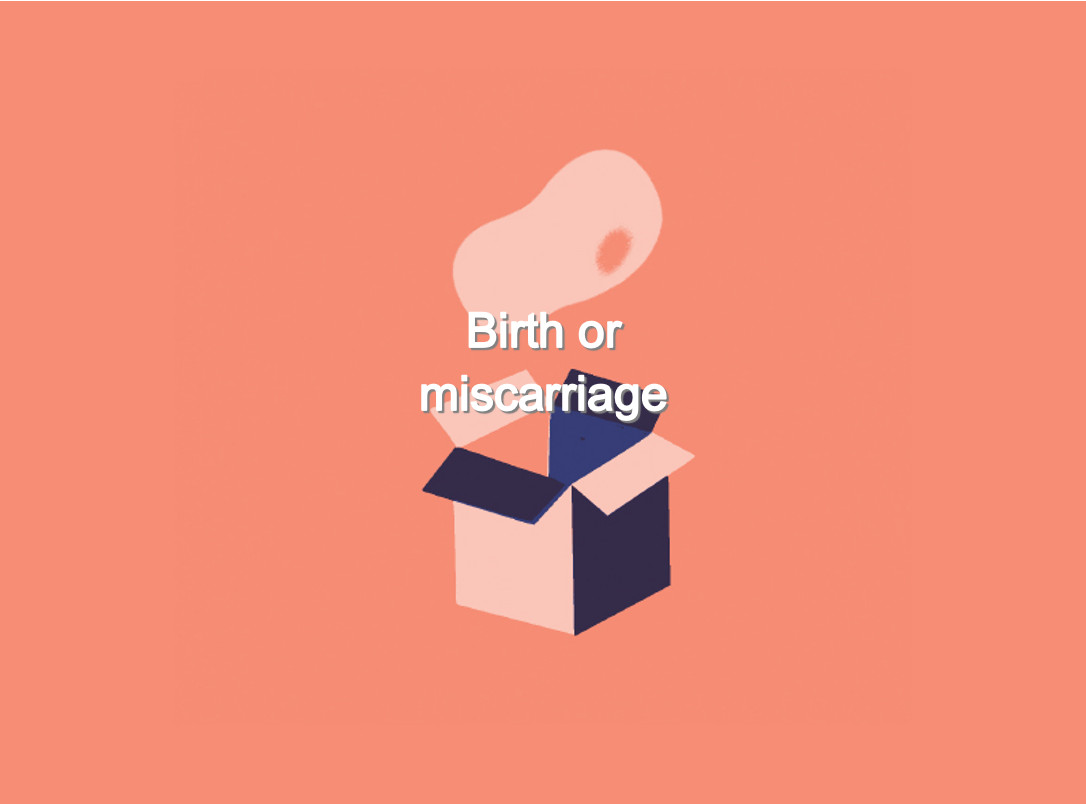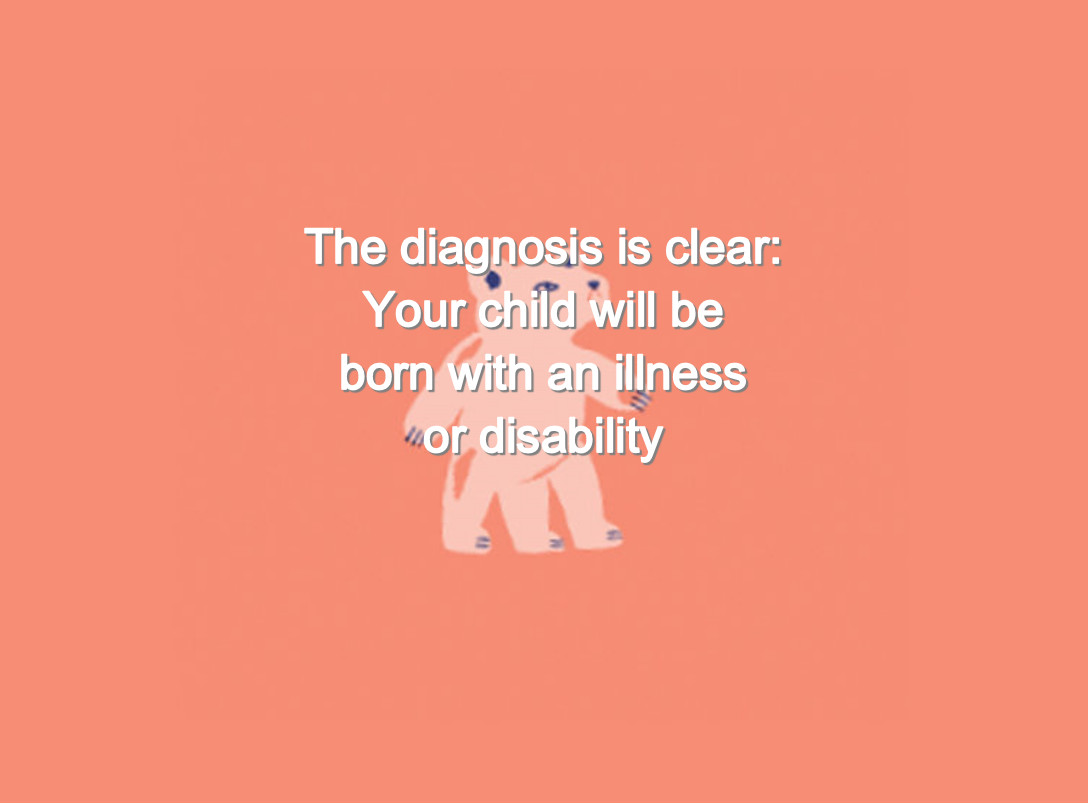
You are going to be parents. A time of heightened emotion lies ahead and, with it, many new questions and topics. A topic which does not often emerge early on without prompting is prenatal screening and testing.
97% of children are born without illness or disability. However, prenatal screening tests such as ultrasound scans (e.g. nuchal translucency) and blood tests for certain illnesses and disabilities of the unborn child are often carried out as a matter of course. Such tests can lead to difficult decisions for you as parents-to-be. This is why we recommend you seek advice as early as possible – it will help you answer the question of whether or not to test with confidence.
Would you like to proceed with the tests?
Non-invasive screening tests
Preliminary, non-invasive screening tests are carried out to determine the chance of the child being born with an illness or a disability
Would you like to have further tests?
Would you like to have further, invasive tests carried out in order to obtain a reliable diagnosis? Less than 0.5% of invasive tests result in a miscarriage – if carried out by experienced practitioners.

Prenatal testing is no guarantee for a healthy child. On one hand, prenatal tests can only detect some of the illnesses and disabilities a child might be born with and on the other, false results can occur. Furthermore, some illnesses and disabilities are the result of birth complications.
Decision concerning a child with a disability
Take the opportunity to get information from your doctor about possible medical measures and to obtain advice and support from parent counselling centres. It can also be helpful to talk directly to other parents who are affected.
The decision to terminate a pregnancy
In many cases, the often-difficult decision to terminate a pregnancy is followed by another stressful period. Professional assistance can be very helpful in the period before, during and after termination of a pregnancy. There are various services from which affected couples can seek support.

Question cards to help you when you talk to your doctor
It’s a good idea to get information on the various prenatal tests and your related rights before you go to see your doctor – because doctors don’t always provide comprehensive explanations. During the consultation with your doctor, it’s advisable to take your time and keep asking questions until the aspects you need to take your decision have been clarified. You can use the downloadable question cards before and after taking (any) prenatal tests to remind yourself of the points to ask your doctor.

Prenatal tests – you decide!
You are going to be parents. A time of heightened emotion lies ahead and, with it, many new questions and topics. A topic which doesn’t often emerge early on without prompting is prenatal screening and testing.
They include regular monitoring of blood pressure, urine status and body weight, as well as ultrasound scans and a range of blood tests. All these examinations can help predict pregnancy complications and potential chromosomal abnormalities or anomalies of the child. Many of these routine screenings have now become standard procedures to an extent that they are no longer even being discussed. However, expert support of parents-to-be should be based on empathy, non-directive information, advice and time – a precious commodity today.
While screening for chromosomal abnormalities such as Trisomy 21 has been a significant part of prenatal diagnostics for decades, the screening concept itself has evolved considerably over the past few years. Non-invasive tests in particular have become much more effective, but also more complex and more difficult to explain and, therefore, more difficult to understand.
We, the insieme parents’ association, care deeply about informing parents-to-be without pressuring them into deciding in favour or against prenatal testing, or in favour or against having a child with an impairment. This brochure is intended to highlight that you have the right to make an informed decision. We would like to provide contacts and links where you can obtain further information and advice, and give you the opportunity to consider the implications of prenatal testing early on in the process of becoming a parent.
Prenatal tests for the unborn child
Prenatal tests – also known as prenatal diagnostics – which are carried out to examine the unborn child, are medical tests to examine the child’s chromosomes and to find evidence of possible anomalies. The tests generally fall into one of two categories: invasive and non-invasive.
Non-invasive tests
Non-invasive tests include ultrasound scans and various blood tests, as well as the first trimester test (ETT) or foetal DNA tests (NIPT). The ultrasound scan is a tool to determine the number of unborn children, to detect anomalies and to monitor amniotic fluid levels as well as the child’s growth. The ETT provides data for a Trisomy 21 risk assessment, but it cannot predict if the unborn child is, in fact, affected. This can only be determined with an invasive test. In the NIPT test, foetal DNA in the mother’s blood is analysed. None of these tests can provide a 100% certainty as to the chromosomal health of the child.
There are various NIPT tests available today – screenings for a range of syndromes and other chromosomal abnormalities. A positive NIPT result is not a certain indicator that the child is affected – an invasive follow-up test is required for confirmation.
Invasive Tests
Invasive testing is the only way to conclusively examine the unborn child’s DNA. Invasive tests involve the ultrasound-assisted sampling of tissue through a needle from the placenta (chorionic villus sampling), from the amniotic fluid (amniocentesis), or, in rare cases, directly from the umbilical chord (cordocentesis). Unlike the non-invasive tests, these examinations can result in a miscarriage. Nowadays, the associated risk is less than 0.5% if the procedure is carried out by a seasoned practitioner.
Prenatal tests are voluntary
Prenatal tests are voluntary. You, as a mother and father-to-be, have the right to decide whether you want to take advantage of all available test methods or just some of them, or if you would rather not have any tests at all. You are entitled to change your mind at any point of the pregnancy and you have the right to ask to not be notified of some or all of the test results if you so wish.
Make sure you are given all the information and advice you need
Before any prenatal tests are carried out, your doctor will inform you about their advantages and disadvantages and about their cost and possible consequences. If necessary, ask for more information and use our list of questions to help you discuss the matter with your doctor. Complement the list with your own questions. In addition, you can always consult any advice centre or parents’ association in the field.
Take your time
Make sure to carefully consider prenatal testing before you agree to have it. After consulting your doctor, you can always ask for a second opinion from an advice centre or parents’ association, talk to your friends and family and perhaps revisit the questionnaire on insieme.ch.
Information and advice centres for prenatal testing:
- Sexual Health Switzerland, register of regional information and advice centres: www.sante-sexuelle.ch
- Association for holistic advice and critical information about prenatal diagnostics: www.praenatal-diagnostik.ch
- appella: www.appella.ch
- Schwanger.li: schweiz.schwanger.li
- Mütterhilfe: www.muetterhilfe.ch
- Prenat.ch: www.prenat.ch
Information and counselling on all aspects of abortion:
- Centre for Child Loss during pregnancy, birth and early life: www.kindsverlust.ch
- Working Group on Abortion and Contraception – Switzerland: www.schwangerschaftsabbruch.org
- Sexual Health Switzerland: www.sante-sexuelle.ch/centres-de-conseil
Parents’ organisations:
- Parents’ associations for people with an intellectual disability and their families – Assocations regional (de / fr)
- insieme21 – parents’ association for people with Trisomy 21 and their families: www.insieme21.ch
- Conference of parents’ associations of children with chronic illnesses and disabilities, contacts to various associations: www.behindertekinder.ch
- Fraxas, association for persons with fragile X syndrome: www.fraxas.ch
Information and counselling in the event of a miscarriage:
- Centre for Child Loss during pregnancy, birth and early life: www.kindsverlust.ch
- Sexual Health Switzerland: www.sante-sexuelle.ch/centres-de-conseil
- Muschel.net – For parents of “angel children” following a miscarriage, stillbirth, premature birth or medically-indicated abortion: www.muschel.net











